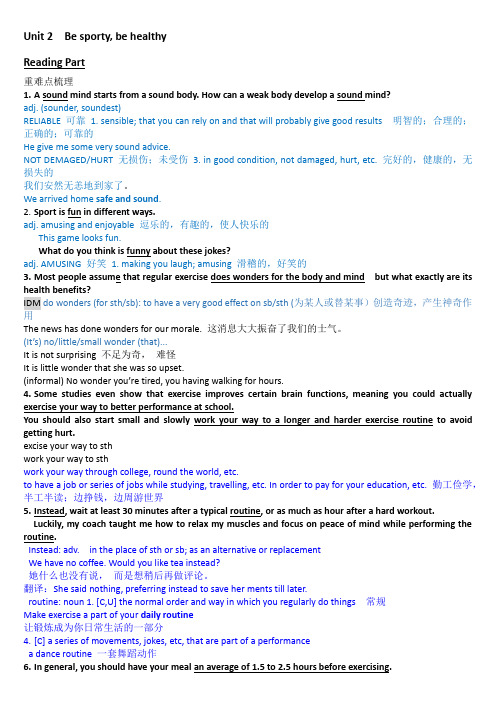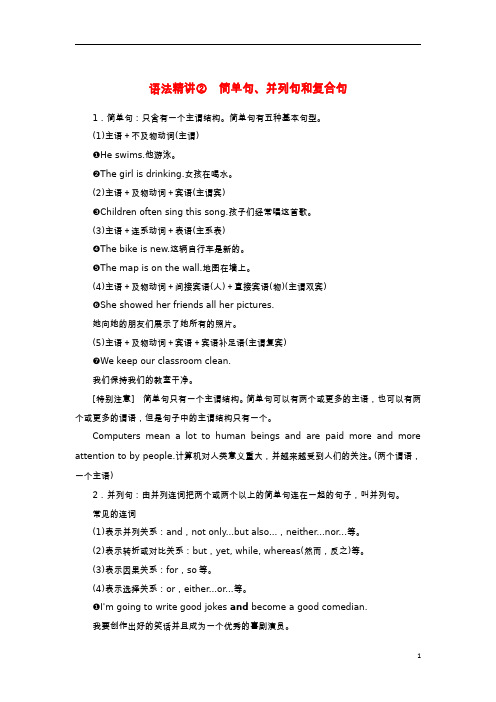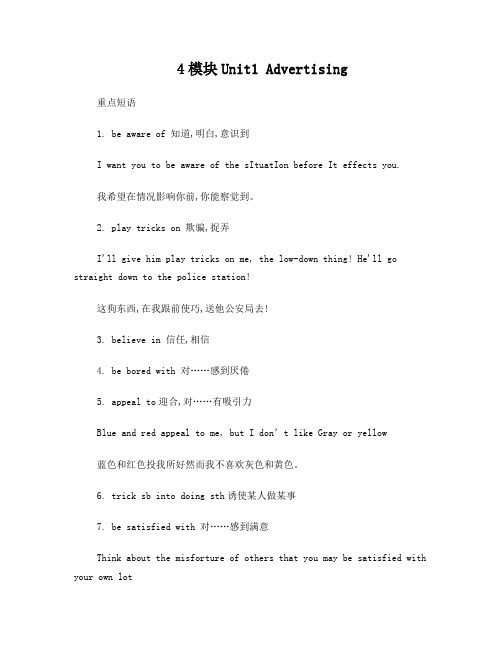牛津高中英语模块四unit2语法资料讲解
江苏省无锡市第一中学译林牛津版高中英语必修四重点短语背诵:unit2 sporting events

江苏省无锡第一中学牛津英语模块短语复习M4U2 sporting events重点短语背诵1. 对……感到愉快be delighted with...以……为乐take delight/pleasure in sth.使某人高兴的是to one's delight2…….重要be of significance=be significant3. 参与……竞争compete in sth.为……和某人竞争compete for sth. with sb.参与竞争take part in a competition4. 在当代社会in contemporary society现代史contemporary history与某人同时代be contemporary with sb.5. 赢得一枚金牌win a gold medal6. 点燃奥运火焰light the Olympic flame点燃一支蜡烛light a candle一支点燃的蜡烛 a lighted candle开始吸一根烟;放光彩;喜形于色light up传递奥运火炬carry the Olympic torch7. 参加开幕式attend an opening ceremony参加闭幕式attend a closing ceremony8. 缺席be absent from 在场be present at在某人不在的时候in/during one's absence在某人面前;有某人在场in sb.'s presence=in the presence of sb.9. 令人兴奋的消息exciting news对……感到兴奋be excited at/about...使某人兴奋的是to one's excitement10. 领先lead the way11. (在逆境中)坚持;紧抓;不挂断hang on紧紧抓住……hang on to sth.闲荡,徘徊hang around/about悬挂;挂断电话hang up12. 使某人欢乐的是to one's joy13. 转交,传给,递给pass sth. on (to sb.)14. 一种交通手段 a means of transport15. 每小时五十英里fifty miles per hour16. 两块吐司two slices of toast为某人的健康干杯toast one's health向某人敬酒toast sb.=drink a toast to sb.17. 在室内/外玩耍play indoors/outdoors室内/外活动indoor/outdoor activities18. 频繁光顾frequently visit=make frequent visits to一个常客 a frequent/regular customer19.超预算beyond budget在预算内within budget 增加预算add to/enlarge/increase a budget减少预算cut (down)/reduce a budget20. 把某人从…中开除remove sb. from...去除……上的污点remove a stain from...消除某人的疑虑remove one's doubts把某人从……移到……remove sb. from...to... 21. 汽艇power boating有能力做have the power to do掌权come into power 当权的in power某人所不及的beyond/out of one's power某人力所能及within one's power22. 给…让路,让位于make way for=give way to 做某事的方法a way of doing sth.=a way to do sth.用这种方法in this way=with this method=by this means=in this manner 在路上,即将到来on the/one's way将要去做on one's/the way to doing挡路,妨碍stand/get in the/one's way顺便问一下by the way在某种意义上in a way在进行之中under way经由by way of23. 进一球score a goal达到目标achieve/reach one's goal24. 对某人不公平be unfair to sb.25. 苦味 a bitter taste严冬 a bitter winter一段痛苦的回忆 a bitter memory对……怨恨be bitter about...尖酸刻薄的话bitter words26. 期间meanwhile=meantime=in the meanwhile=in the meantime27. 把……绑起来,系紧tie up把……拴在……上tie...to...商业上来往business ties打着蓝色领带wear a blue tie以平局结束end in a tie=end in a draw28. 宝贵的生命precious life29. 破记录break the record创记录set a record保持记录hold the record录唱片make a record记录,记载keep a record of...=record...30.申办奥运bid for the Olympic Games31.各自生活live/lead separate lives=live/lead lives separately把……和……分开separate...from32. 非常好pretty good33. 因……而受到尊敬be honoured for被授予……荣誉be honoured as为…表敬意;为庆祝;为了纪念in honour of 做某事感到荣幸be/feel honoured to do sth. =have the honour of doing sth.做某事是光荣的It is an honour to do sth.=It is honourable to do sth.34. 杀人未遂an attempted murder一次性at the first attempt试图做attempt to do=make an attempt to do 35.为了让某人做in order for sb. to do sth.。
Unit2BeSportyBeHealthy重点词汇语法讲义高中英语牛津译林版(2020)

Unit 2 Be sporty, be healthyReading Part重难点梳理1.A sound mind starts from a sound body. How can a weak body develop a sound mind?adj. (sounder, soundest)RELIABLE 可靠1. sensible; that you can rely on and that will probably give good results 明智的;合理的;正确的;可靠的He give me some very sound advice.NOT DEMAGED/HURT 无损伤;未受伤3. in good condition, not damaged, hurt, etc. 完好的,健康的,无损失的我们安然无恙地到家了。
We arrived home safe and sound.2.Sport is fun in different ways.adj. amusing and enjoyable 逗乐的,有趣的,使人快乐的This game looks fun.What do you think is funny about these jokes?adj. AMUSING 好笑1. making you laugh; amusing 滑稽的,好笑的3.Most people assume that regular exercise does wonders for the body and mind but what exactly are its health benefits?IDM do wonders (for sth/sb): to have a very good effect on sb/sth (为某人或替某事)创造奇迹,产生神奇作用The news has done wonders for our morale. 这消息大大振奋了我们的士气。
Unit+2+单词课件-2022-2023学年高中英语牛津译林版(2020)选择性必修第四册+

9.negotiate vi.&vt.谈判;商定,达成(协议) →negotiator n. 商议者;谈判者 →negotiation n. 商议;谈判 1)negotiate with sb. about/for sth. =negotiate sth. with sb. 与某人协商/谈判某事 2)be in negotiation with sb. 与某人商议
account vi. 解释,说明;(数量上、比例上)占 v. 认为,视为(account...as...) n. 账户,账目;说明,解释;叙述,描写
an account 账户 give a(n)...account of... 描述/叙述……
take sth. into account
=take account of sth. 考虑到某事 on account of 因为 on no account 决不,绝对不(位于句首时应用部分 倒 装结构)by no means,in on way/case/circumstances
react to... 对……作出反应;对……过敏
react against 反对;反抗 react with 与……起化学反应
Iron reacts with water and air to produce rust. 铁和水及空 气发生反应产生铁锈。
2.gentle adj.温柔的;温和的;柔和的 →gently adv. 温柔地,温和地 →gentleness n. 温顺;亲切;高贵;彬彬有礼
7.obtain vt.获得,赢得
obtain sb. sth. obtain sth. for sb. 使某人获得某物 obtain sth. from sb./sth. 从某人/某物获得某物 obtainable adj. 能得到的
牛津高一英语模块4Unit2grammarandusage

C. may not D. might not
3. They will __D____ run this machine on their
own in three months.
A. can
B. could
C. may
D. be able to
4. That big cinema __A____ seat 2,000 people.
西).
A. mightn’t
B. won’t
C. needn’t
D. mustn’t
解析:考查情态动词。英语中用could, might表示询问或征求意见的问句中,肯定 性应答要用can或may来代替could或might, 而may或might征求意见的问句否定应答时 要用mus中可用各人 称作主语, 表示其 “意志” “意愿” “决心”等。
② 在疑问句中用第二人称作主语, 表示说 话人向对方提出请示或询问。
③ 有时表示一种习惯动作或状态或自然 规律。
8. would ① 可用于各人称, 表示过去时间的 “意志”
“愿望” 和 ‘决心”。 ② 表示说话人本身的 “意志” 或向对方提
shall / will
shall表示允诺; will表示决心或决定。
Don’t worry. You shall have the tickets for the games. Liu Mei will go and buy the tickets for the games.
在疑问句中,shall用于第一人称或第三人 称后,表示提供帮助或给出建议;will用于 第二人称或第三人称后,表示询问意愿。
解析:don’t have to 意为“没有必要”, 符
牛津高中英语模块四unit2语法

Unit 2 语法情态动词一.基本概念情态动词作为谓语的一部分,无人称和数的变化;不能单独使用,与谓语动词构成完整谓语,不能单独作谓语,但在省略回答时,可单独使用。
二.基本用法(一)can 和could1.表示能力或客观可能性,还可以表示请求和允许。
e.g. Can you finish this work tonight?(表示能力)Man cannot live without air. (表示客观可能性)—Can I go now?—Yes, you can. (表示请求或允许)① could 也可表示请求,语气委婉。
主要用于疑问句,不可用于肯定句,答语应用can (即:could 不能用于现在时态的简略答语中)。
e.g. —Could I come to see you tomorrow?—Yes, you can. (否定答语可以用:No,I'm afraid not.)②can表示能力时= be able to doe.g. I'll not be able to come this afternoon.注:can 只能用于一般现在时和一般过去时(could);be able to do 可以用于任何时态中。
2.表示惊异、怀疑、不相信的态度。
(主要用于否定句、疑问句或感叹句中)e.g. Can this be true?How can you be so careless!His cannot be done by him.3."can (could)+have+done" 的疑问或否定形式表示对过去发生的行为怀疑或不肯定。
e.g. He cannot have been to that town.Can he have got the book?4.归纳拓展① cannot but 不得不e.g. I cannot but admire his courage. 我不得不佩服他的勇气。
高中英语Unit2Let'stalkteens语法精讲2简单句并列句和复合句学案牛津译林版必修第一册

语法精讲② 简单句、并列句和复合句1.简单句:只含有一个主谓结构。
简单句有五种基本句型。
(1)主语+不及物动词(主谓)❶He swims.他游泳。
❷The girl is drinking.女孩在喝水。
(2)主语+及物动词+宾语(主谓宾)❸Children often sing this song.孩子们经常唱这首歌。
(3)主语+连系动词+表语(主系表)❹The bike is new.这辆自行车是新的。
❺The map is on the wall.地图在墙上。
(4)主语+及物动词+间接宾语(人)+直接宾语(物)(主谓双宾)❻She showed her friends all her pictures.她向她的朋友们展示了她所有的照片。
(5)主语+及物动词+宾语+宾语补足语(主谓复宾)❼We keep our classroom clean.我们保持我们的教室干净。
[特别注意] 简单句只有一个主谓结构。
简单句可以有两个或更多的主语,也可以有两个或更多的谓语,但是句子中的主谓结构只有一个。
Computers mean a lot to human beings and are paid more and more attention to by people.计算机对人类意义重大,并越来越受到人们的关注。
(两个谓语,一个主语)2.并列句:由并列连词把两个或两个以上的简单句连在一起的句子,叫并列句。
常见的连词(1)表示并列关系:and,not only...but also...,neither...nor...等。
(2)表示转折或对比关系:but,yet, while, whereas(然而,反之)等。
(3)表示因果关系:for,so等。
(4)表示选择关系:or,either...or...等。
❶I'm going to write good jokes and become a good comedian.我要创作出好的笑话并且成为一个优秀的喜剧演员。
牛津高一英语模块4unit2grammar

they? • His parents must have beaten him
yesterday, didn’t they?
can / be able to
• can 的形式只有can ;could两种 • be able to 的形式有am/is/are able to;
用作实义动词时
• We need to tell him the news. • You don’t need to tell him the news. • Do the flowers need watering? • I didn’t dare to tell you the truth. • Would you dare to catch the snake with
your hand? • The boy dares to do anything he likes.
1. Shall we go swimming this weekend? 2. A group of students are waiting to see you
outside. Shall they come in? 3. Will you go hiking with me in the
mountains? 4. Will he pay for me ?
was/were able to; have/has been able to 等多种 • Can 一般能力 • Be able to 经过努力后而达到的一定境界 • My brother can play table tennis. • My brother is able to dive under water for 10 minutes.
牛津高中英语模块4知识点总结

4模块Unit1 Advertising重点短语1. be aware of 知道,明白,意识到I want you to be aware of the sItuatIon before It effects you.我希望在情况影响你前,你能察觉到。
2. play tricks on 欺骗,捉弄I'll give him play tricks on me, the low-down thing! He'll go straight down to the police station!这狗东西,在我跟前使巧,送他公安局去!3. believe in 信任,相信4. be bored with 对……感到厌倦5. appeal to迎合,对……有吸引力Blue and red appeal to me, but I don’t like Gray or yellow蓝色和红色投我所好然而我不喜欢灰色和黄色。
6. trick sb into doing sth诱使某人做某事7. be satisfied with 对……感到满意Think about the misforture of others that you may be satisfied with your own lot想想别人的不幸,你可以对自己的命运感到满足8. be used to对……习以为常,习惯于There are a few verbs which fit into both groups and a hyphenmay be used to show the distinction还有一些动词适合于上述两种情况,可用连接号表示这种区别9. fall for 上……的当,受……骗I can't believe you would fall FOR that old trick.我不相信你会上那老把戏的当。
- 1、下载文档前请自行甄别文档内容的完整性,平台不提供额外的编辑、内容补充、找答案等附加服务。
- 2、"仅部分预览"的文档,不可在线预览部分如存在完整性等问题,可反馈申请退款(可完整预览的文档不适用该条件!)。
- 3、如文档侵犯您的权益,请联系客服反馈,我们会尽快为您处理(人工客服工作时间:9:00-18:30)。
Unit 2 语法情态动词一.基本概念情态动词作为谓语的一部分,无人称和数的变化;不能单独使用,与谓语动词构成完整谓语,不能单独作谓语,但在省略回答时,可单独使用。
二.基本用法(一)can 和could1.表示能力或客观可能性,还可以表示请求和允许。
e.g. Can you finish this work tonight?(表示能力)Man cannot live without air. (表示客观可能性)—Can I go now?—Yes, you can. (表示请求或允许)① could 也可表示请求,语气委婉。
主要用于疑问句,不可用于肯定句,答语应用can (即:could 不能用于现在时态的简略答语中)。
e.g. —Could I come to see you tomorrow?—Yes, you can. (否定答语可以用:No,I'm afraid not.)②can表示能力时= be able to doe.g. I'll not be able to come this afternoon.注:can 只能用于一般现在时和一般过去时(could);be able to do 可以用于任何时态中。
2.表示惊异、怀疑、不相信的态度。
(主要用于否定句、疑问句或感叹句中)e.g. Can this be true?How can you be so careless!His cannot be done by him.3."can (could)+have+done" 的疑问或否定形式表示对过去发生的行为怀疑或不肯定。
e.g. He cannot have been to that town.Can he have got the book?4.归纳拓展① cannot but 不得不e.g. I cannot but admire his courage. 我不得不佩服他的勇气。
② cannot (couldn't)help+doing 情不自禁e.g. When I heard what the little girl said I couldn't help laughing. 当我听见小女孩所讲的,不禁大笑起来。
③ cannot...too...怎么...也不过分e.g. You cannot be too careful in the choice of your friends.你在选择朋友时,怎么小心也不过分。
⑤表示经过努力才能完成之事不可用could, 而只能用 be able to。
e.g. Because he worked hard, he was able to pass the exam.因为他努力了才会通过考试。
(二)may 和might1.表示许可。
表示请求、允许时,might比may 的语气更委婉一些,否定回答时要用mustn't,表示“不可以、禁止、阻止”之意。
e.g. You drive the car.—Might I use your pen?— No, you mustn't.2.表示推测、可能(疑问句不能用于此意)。
e.g. He may be very busy now.3.用于祈使句中表示祝愿。
e.g. May you succeed!4.表示请求或规劝。
e.g. You might pay more attention to me.5.“may (might)+ have done”表示对过去发生的行为的推测。
e.g. He may not have finished the work.6.归纳拓展① may not 表示一种礼貌的“不可”。
e.g. You may not leave the thing half done.② might 可表示忠告;责备。
e.g. Y ou have broken tow dishes. You might try to be more careful.③“may well+do原形”表示理所当然。
e.g. You may well say so.你当然可以这样讲。
④may as well+do原形+as+动词原形“与其...不如;最好...不要。
”e.g. You might as well throw your money away as lend it to him.你要借钱给他,不如把钱扔了。
(三)can和may1.表示可能时,may 仅用于肯定句;而can 可用于各种句式。
e.g. You may be right.你可能是对的。
(may用于肯定句)You can be right.你可能是对的。
(can用于肯定句)Can you be right?你可能是对的吗?(can 用于疑问句)You cannot be right. 你不可能是对的。
(can 用于否定句)2.表示允许时,二者意义相同,只是may 比较正式,而can比较口语化。
e.g. May I smoke here? 我可以在这儿吸烟吗?Can I use your pen? 我可以用你的钢笔吗?(四)must 和have to1.must “必须”,强调的是一种主观看法,也表示责任或任务;have to “必须”,强调的是客观需要,有时态的变化。
e.g. You must take your doctor's advice. (主观看法)你必须采纳医生的建议。
You have to take your doctor's advice. (客观需要)你必须采纳医生的建议。
You must obey the rules.(责任或义务)注:回答must引出的问句时,如果是否定回答,不能用mustn't,而用 needn't 或don't have to.e.g.—Must we hand in our exercise books today?—Yes, you must.(— No,you don't have to.)2.“must be+表语”,表示推测。
其否定或疑问形式用can代替must.e.g. This must be your pen.3.“must+have done”,表示对过去发生的行为的推测,其否定或疑问形式用can代替must.e.g. He must have been to Shanghai.(五)dare 和need1.need “需要”。
作情态动词时,仅用于否定句或疑问句中。
e.g. You needn't come so early.— Need I finish the work today?— Yes, you must.注:needn't have done “本来没有必要做某事而实际上却做了”e.g. You needn't have waited for me.2.dare 作情态动词时,主要用于疑问句、否定句和条件句中,一般不用于肯定句中。
e.g. How dare you say I'm unfair?He daren't speak English before such a crowd, dare he?3.dare 和need 常作实义动词。
有时态、人称和数的变化。
在肯定句中,dare 后面常接带to的不定式。
在否定句和疑问句中,dare后面可接带to或不带to 的不定式。
e.g. I dare to swim across this river.He does not dare (to) answer.Don't you dare (to) touch it?(六)shall 和should1.shall 用于第一人称表示征求对方的意见。
e.g. What shall we do next?2. shall 用于第一、第三人称疑问句中,表示说话人征求对方的意见或向对方请示。
e.g. Shall we begin our meeting?When shall we leave the hospital?3. shall 用于第二、第三人称,表示说话人给对方的命令、警告、允诺或威胁。
e.g. You shall fail if you don't work harder.(警告)He shall have a look when I finish reading.(允诺)He shall be punished. (威胁)4.表示推测或可能。
e.g. They should finish the work by now.5.should 表示劝告、义务、建议、命令,其同义词是 ought to, 在疑问句中通常用should 代替ought to.e.g. We should learn some English.Should I open the window?6.should 可以用在if引导的条件句中,表示一件事听起来可能性很小,但也不一定完全没有可能;相当于“万一”的意思,从句谓语由“should+do原形”构成,主句谓语却不一定用虚拟语气。
e.g. Ask her to ring me up if you should see her.你万一见到她,让她给我打个电话。
If you should change your mind, please let me know.万一你改变主意,请通知我。
7.“why/how等疑问副词+should”,表示说话人对某事不能理解,感到意外、赞叹、愤怒、惊讶等感情,意思为“竟然”。
e.g. Why should you be so late today?你今天怎么来这么晚?— Where is Betty living?— How should I know? 我怎么会知道!I don't know why you should think that I did it.我真不知道你凭什么认为这件事是我干的。
8. should +have done “本应该做而实际上没有做”(虚拟语气)e.g. You should have started earlier.(七)will 和would1.表示请求、建议等,would 比will语气委婉、客气。
e.g. Would you pass me the salt?2.表示意志、愿望和决心。
e.g. I will never do that again.They asked us if we would do that again.3.表示习惯动作。
